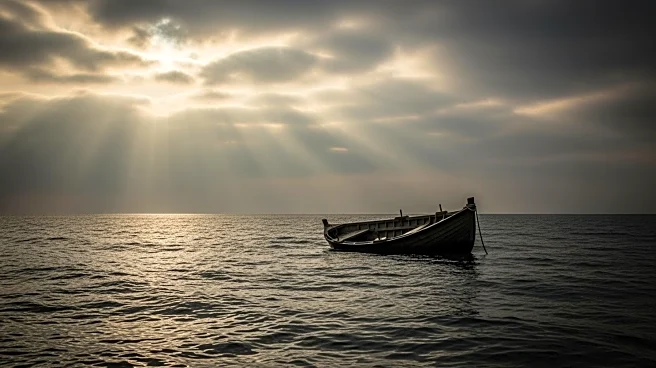What's Happening?
At least 42 migrants are missing and presumed dead after a rubber boat capsized off the coast of Libya, according to the International Organization for Migration (IOM). Libyan authorities rescued seven survivors who had drifted at sea for six days after the vessel,
carrying 49 people, sank near the Al Buri oilfield, an offshore facility north-northwest of the Libyan coast. The migrants were from Sudan, Nigeria, Cameroon, and Somalia. Libya has become a transit route for migrants fleeing conflict and poverty to Europe across the Mediterranean since the fall of dictator Muammar Gaddafi in 2011. The number of migrants who drowned in the central Mediterranean had already surpassed 1,000 this year, and this week's incident raised that toll further.
Why It's Important?
This tragic event highlights the ongoing humanitarian crisis faced by migrants attempting to cross the Mediterranean Sea. The central Mediterranean route remains one of the deadliest migration paths, with over 1,000 deaths reported this year alone. The incident underscores the urgent need for international cooperation to address the root causes of migration and improve safety measures for those seeking refuge. Countries involved in the migration crisis, including Libya, face pressure to reform policies and improve conditions for migrants. The situation also calls for increased efforts from international organizations to provide aid and support to affected individuals.
What's Next?
Several states, including Britain, Spain, Norway, and Sierra Leone, have urged Libya at a U.N. meeting in Geneva to close detention centers where rights groups report migrants and refugees have been tortured, abused, and sometimes killed. The international community may increase diplomatic pressure on Libya to improve its handling of migrant issues and ensure better protection for those in transit. Further discussions and actions at the U.N. level could lead to policy changes aimed at reducing the risks faced by migrants in the region.
Beyond the Headlines
The ongoing migration crisis in the Mediterranean has broader implications for global human rights and international relations. The ethical responsibility of nations to protect vulnerable populations and the legal obligations under international law are critical considerations. Long-term solutions may involve addressing economic disparities and political instability in migrants' home countries, which drive individuals to seek better opportunities abroad.















